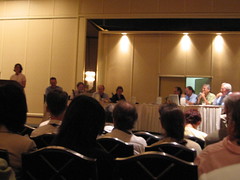 This afternoon I attended LITA’s panel discussion on top tech trends. Unfortunately my notetaking wasn’t quite fast enough to always catch who said what, but there were some interesting overall points made.
This afternoon I attended LITA’s panel discussion on top tech trends. Unfortunately my notetaking wasn’t quite fast enough to always catch who said what, but there were some interesting overall points made.
Several panelists commented on the rising opinion that “OPACs suck”. But they put a positive spin on it, hoping that the growing dissatisfaction with the catalogs will prompt changes. “We’re fighting back.”
Social software and online comunities was a biggie. Karen Schneider brought up an interesting point: Are we reading the privacy policies of the third party sites that libraries are starting to trust data too? She suggested in particular that Flickr’s policies (via their owners, Yahoo) may not be on the up and up. I suppose I’ll have to start reading the fine print…
A few people brought up the fact that federated searching is not working. I agree, but only to a point. At UAH we have a federated search system up and running, that a recent survey shows the vast majority (I can’t remember the exact numbers offhand) of users prefer it over searching individual databases. I’m quite pleased with it personally, and wonder if other libraries attempting federated search simply haven’t found the right software for their situation. But that said, I find the idea of metadata harvesting to be deeply interesting. If nothing else, using it could vastly speed up the searching of multiple databases at once.
For a bit of perspective Eric Morgan mentioned that this is LITA’s 40th year of existence, and that 55 years ago today (well, yesterday by the time I post this), the first color television broadcast went out. How far we’ve come in such a short time!
Audience questions at the end brought up the topic of digitization of paper resources. Panelists agreed that the digitization of the physical document itself is the easy part. Securing the rights, a useful search system, etc. are where the difficulty lies. Also, I wish I could remember who said “Google Book Search makes our OPACs look good.”
How do the panelists identify trends? They go outside libraryland, and see what the public is doing elsewhere. They look at Newsweek and Time articles for ideas of what has gone mainstream. And lastly, they watch non-techies to see what gets picked up.
This was a great session with a light tone and relevant topics.